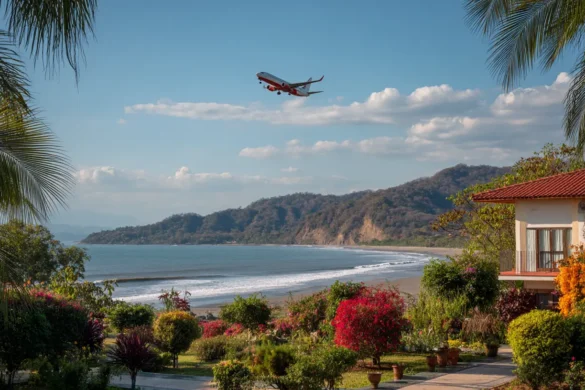In my 20s, I treated travel insurance like a scam. I’d rather spend that extra cash on street food in Bangkok or a surfboard rental in Costa Rica, and for a while, I got away with it. But the older I got (and the more miles I logged) the more I saw how reckless that mindset was. Friends stuck with $10,000 hospital bills after scooter crashes in Bali, a buddy airlifted out of the Alps, even a couple I met in South America who had their entire backpack stolen with passports inside.
I’ve had my own close calls too, the kind that could’ve ruined a trip (and my bank account) if I hadn’t been covered. Now in my 30s, travel insurance is non-negotiable. These aren’t abstract “what ifs”…they’re real stories, mine and others’, that explain exactly why skipping insurance in 2025 could be the costliest mistake you make.
For a limited time only, I’ve been able to secure 50% off rates with my travel insurance partners. Here are my favorite travel insurance companies in 2025.
What is travel insurance?
Travel insurance is basically your safety net for when things go wrong on the road. At its core, it’s a policy you buy before your trip that protects you financially (and sometimes medically) if unexpected situations pop up. That could mean covering the cost of a last-minute flight cancellation, paying your hospital bill if you get sick abroad, or reimbursing you if your bag full of gear disappears somewhere between Dubai and Delhi.
There are different types of coverage, and policies vary a lot, but the main buckets are: trip protection (cancellations, delays, interruptions), medical coverage (doctor visits, emergency care, hospital stays), and baggage protection (lost, stolen, or delayed luggage). Some plans even include things like rental car coverage or emergency evacuation, which can save you tens of thousands of dollars.
In short: travel insurance is the one thing you hope you’ll never need, but will be unbelievably glad you have if you do. I’ll cover these different plans/policies in more detail below.

A quick story on the importance of travel insurance…
I had a friend who went on a dream vacation to Europe. Everything was going great until he fell and broke his arm on a hike in the Swiss Alps. Not only was he in pain, but he had to go to the hospital and pay for medical care out of pocket. The bills ended up costing him thousands of dollars.
If he had travel insurance, he could have been reimbursed for those unexpected medical expenses. Not only that, but travel insurance also covers things like trip cancellations, lost luggage, and emergencies that may arise while you’re abroad.
So, it’s always better to be safe than sorry. Trust me, you don’t want to end up like my friend with a broken arm and a lighter wallet. As such, travel insurance can give you peace of mind and protection when you’re away from home. Now, without further ado, here are some key reasons for when to buy travel insurance & some more stories from years on the road.

1. You can get sick or injured
Medical emergencies abroad are honestly one of the scariest things that can happen while traveling. My friend Sarah learned this the hard way during what was supposed to be a dream trip to Thailand. She got food poisoning that turned into severe dehydration and ended up in a Bangkok hospital for three days.
The bill? Over $8,000. Her regular health insurance back home didn’t cover international emergencies, so she had to pay everything out of pocket. What made it worse was trying to navigate the Thai healthcare system while feeling terrible and not speaking the language.
If you’re traveling internationally, your domestic health insurance probably won’t help you. Even within the US, you might be out of network in some areas. Travel medical coverage isn’t just about the money – many policies include 24/7 assistance services that help you find quality medical facilities and even arrange transportation.
Emergency medical evacuation is the big one though. If you need to be airlifted from a remote area or flown back home for treatment, you’re looking at tens of thousands of dollars. I’ve seen single evacuation bills hit $100,000+. It’s not worth rolling the dice on something that expensive.
2. Flight delays or cancellations
Flight disruptions are way more common than people think. Last year alone, over 1.3 million flights were delayed and about 88,000 were cancelled in the US. My colleague Mike got stuck in this nightmare during a Munich layover.
His connecting flight to Rome got cancelled due to a strike, and the airline’s “help” was a five-hour customer service line and a voucher for a hotel 45 minutes away. No meal vouchers, no rebooking assistance, just “figure it out yourself.” He ended up spending $400 on a new flight, plus meals and an extra hotel night.
✈️ My #1 Hack for Cheap 2026 Flights:
It’s January, so flight prices are climbing fast—but you don't have to pay them. I’m currently seeing roundtrips to Europe for under $300 (deals you won’t find on Google Flights).
Step 1: Join Going.com's Free Plan here. It takes 10 seconds and requires no credit card.
Step 2: If you're doing a big trip this year, grab the 14-day free trial of Premium. You can even use my code JON25 for 25% off.
Seriously, this is the single best money-saving tool I’ve used in 8+ years.
👉 Send me cheap 2026 flightsThe really frustrating part? The airline wouldn’t let him submit reimbursement requests online – everything had to be done in person at that chaotic airport counter. With travel insurance, he could’ve been reimbursed for all those extra expenses without dealing with airline bureaucracy.
Modern airlines run super tight schedules, so when something goes wrong, the domino effect is brutal. Weather, mechanical issues, crew shortages – there are so many variables outside your control. Trip delay coverage typically reimburses you for meals, accommodation, and even rebooking fees when delays exceed a certain threshold.
- Read next: Essential International Travel Tips

3. Your travel organization goes bankrupt
This one hits different because there’s literally nothing you can do about it. A friend of mine, Tom, booked a cruise to the Caribbean six months in advance. Two weeks before departure, the cruise line filed for bankruptcy and just… disappeared.
He was out $4,500 with zero recourse. The cruise line’s customer service phones went straight to voicemail, their website went dark, and his credit card company said it was too late to dispute since he’d booked so far in advance. It was brutal to watch someone get completely screwed through no fault of their own.
Remember WOW Air? They went out of business literally overnight in 2019, stranding thousands of passengers with worthless tickets. Same thing happened with Thomas Cook in the UK – 600,000 travelers suddenly had no flights, no hotels, nothing.
Financial default coverage in travel insurance specifically protects against this scenario. It covers your pre-paid, non-refundable expenses up to the policy limit when airlines, cruise lines, or tour operators go belly-up. It’s not something you think about until it happens, but when it does, you’ll be incredibly grateful to have coverage.
4. Your luggage is lost, delayed, or stolen
Lost luggage is honestly one of the most common travel headaches. My friend Jessica flew to Iceland for a wedding and her bag – with her dress, shoes, and all her cold weather gear – decided to vacation in Frankfurt instead.
The airline kept saying it would arrive “tomorrow” for four days straight. She ended up spending $600 on emergency clothes in Reykjavik (where everything costs a fortune), plus she had to buy a completely new outfit for the wedding. The airline eventually reimbursed her $200, which didn’t even cover the dress.
Airlines are notorious for lowballing baggage claims. They’ll depreciate your stuff, exclude certain items entirely, and make you jump through hoops to prove ownership. Plus, most airlines won’t even start the claims process until your bag’s been missing for 24+ hours, which doesn’t help when you need clothes immediately.
Baggage delay coverage kicks in much faster – usually after just 12 hours for international flights. It covers reasonable expenses for essential items while you wait for your stuff to show up. And if your luggage is permanently lost or stolen, baggage loss coverage typically pays out more than airlines will and with way less hassle.
The key is documenting everything – keep receipts for emergency purchases and file reports immediately with both the airline and your insurance company.

5. The weather affects your travel plans
Mother Nature doesn’t care about your vacation plans. My neighbor David learned this when Hurricane Dorian absolutely destroyed the Bahamas resort where he was supposed to stay for his anniversary trip.
The resort was completely uninhabitable – like, roof blown off, flooding, the works. But since he’d booked everything separately and didn’t have travel insurance, he lost the entire $3,200 he’d paid in advance. The resort eventually offered a credit, but only valid for two years and only at their properties (which were still being rebuilt).
Weather-related cancellations are tricky because they’re often considered “foreseeable” if you’re traveling during hurricane season or to areas with known weather risks. But travel insurance with weather coverage can protect you when natural disasters damage your destination or make travel impossible.
The coverage usually kicks in when there’s significant damage to your accommodation or if authorities issue evacuation orders. Some policies even cover “hurricane tracking” – if a named storm is heading toward your destination within a certain timeframe of your trip.
What people don’t realize is that weather coverage also applies to your departure city. If a blizzard grounds flights at your home airport, you could be covered for additional accommodation and meals while waiting to leave.
6. A travel emergency occurs that you didn’t predict
Life has zero respect for your travel plans. My friend Lisa was halfway through a European backpacking trip when her dad had a heart attack back home in California. She needed to get back immediately, which meant ditching the rest of her trip and buying a last-minute flight.
The emergency flight cost $1,800, she lost the money on her remaining accommodations and a Swiss Alps hiking tour she’d been excited about for months. All told, she was out about $4,000 plus the emotional stress of dealing with a family emergency while navigating international travel logistics.
Trip interruption coverage would’ve reimbursed her for the unused portion of her trip plus the cost of getting home early. Most policies cover serious illness or death of immediate family members, but you need to read the fine print about what qualifies as a “covered reason.”
Some policies also include “family accommodation” benefits – if you’re hospitalized during your trip and need someone to stay with you, they’ll cover flights and accommodation for a family member to come help. It’s something you hope you’ll never need, but incredibly valuable when life goes sideways.
The key is acting fast and keeping all documentation. Insurance companies need proof of the emergency and receipts for any additional expenses you incur.
7. Rental car accident
Even the most careful drivers can get blindsided by stuff beyond their control. My friend Rachel was driving through Vermont on a gorgeous fall day when she hit a massive pothole that completely destroyed the rental car’s tire and rim.
She’d declined the rental company’s collision coverage to save money (it was like $25/day), figuring her regular car insurance would cover it. Wrong. Her personal policy didn’t cover rental cars internationally, and even domestically, she had to pay the $500 deductible plus the car was out of commission for two days while repairs were made.
The rental company charged her $800 for the damage plus loss of use fees. Her credit card had some rental coverage, but it was secondary to her personal insurance and required a bunch of paperwork she didn’t have while on the road.
Rental car coverage in travel insurance is often more comprehensive than what you get from credit cards or personal auto policies. It typically covers damage, theft, and sometimes even the dreaded “loss of use” fees that rental companies love to tack on.
International rental coverage is especially important because your US auto insurance likely won’t work overseas. Plus, driving laws and insurance requirements vary wildly between countries. Having travel insurance that specifically covers rental cars gives you one less thing to worry about when you’re navigating foreign roads.
- Read next: New England Road Trip Itinerary

8. A terrorism-related event occurs
This is the stuff nobody wants to think about, but unfortunately, we live in a world where it’s a real risk. I was actually in Nice, France during the morning of Bastille Day in 2016, leaving the city just hours before the attack that killed crowds of people on the Promenade des Anglais. A friend wasn’t so lucky – he was there during the attacks and his hotel was in the lockdown zone.
He couldn’t leave his hotel for two days, missed his flight home, and had to rebook everything once the city reopened. His original flight was non-refundable, and the hotel charged him for the extra nights even though he was basically trapped there by circumstances completely outside his control.
Terrorism coverage in travel insurance can reimburse you for additional accommodation, rebooking fees, and other expenses when attacks affect your travel plans. Some policies also cover trip cancellation if a terrorist incident occurs at your destination within a certain timeframe before your departure.
The tricky part is that coverage usually only applies to incidents that happen after you purchase your policy and within specific timeframes. So you can’t buy insurance after something happens and expect to be covered.
What’s sobering is that these events can happen anywhere – London, Barcelona, Las Vegas, Brussels. It’s not just about traveling to “dangerous” places. Having coverage gives you some financial protection when the unthinkable disrupts your plans.
9. Loss of a family member (or friend)
Losing someone close to you is devastating enough without having to worry about lost travel expenses. My friend Chris was supposed to leave for Japan when his mom passed away suddenly from a stroke. Obviously, the trip was the last thing on his mind.
He’d spent months planning this bucket-list trip – flights, accommodations, a Tokyo food tour he’d been excited about forever. All non-refundable, totaling about $5,000. The airlines and hotels basically said “sorry for your loss, but no refunds.” It felt like getting kicked while he was already down.
Most travel insurance policies cover trip cancellation due to death of immediate family members (and sometimes close friends), but the definitions can be pretty specific. “Immediate family” usually means spouse, parents, children, and siblings, but policies vary on things like in-laws, grandparents, or close friends.
Some policies also cover serious illness that requires your presence, like if a parent is hospitalized and needs care. The key is having documentation – death certificates, doctor’s letters, that kind of thing.
What people don’t realize is that some policies also cover if the death happens to someone you’re traveling with. If your travel companion loses a family member and has to cancel, you might be covered too since you can’t take the trip as planned.
10. Work-related cancellation
Work emergencies seem to have perfect timing for ruining vacations. My friend Marcus had a week planned in Costa Rica when his company got acquired literally two days before his departure. His new bosses said the transition was “critical” and canceled all time off.
He lost $2,800 on flights and accommodations that couldn’t be refunded or rescheduled. His company felt bad but said their hands were tied – the acquisition timeline was set by lawyers and investors, not something they could control.
Work-related trip cancellation coverage is trickier than other benefits because policies are specific about what qualifies. Usually, it covers things like being laid off, required overtime that conflicts with your trip, or your company becoming “unsuitable” due to damage from fires, floods, or other disasters.
But here’s the catch – routine work schedule changes or voluntary overtime usually aren’t covered. The work conflict has to be truly unavoidable and beyond your control. Some policies require that you’ve been at your job for a minimum time period before coverage kicks in.
If you’re in a profession where work emergencies are common (healthcare, emergency services, certain tech roles), it’s worth upgrading to a policy with comprehensive work-related coverage. The cost difference is usually minimal compared to what you could lose on a expensive trip.
- Read next: Coolest Travel Jobs in the World

11. You miss your connecting flight or cruise connection
Tight connections are basically gambling with your vacation plans. My friend Kevin learned this the hard way flying from Seattle to Barcelona via Amsterdam. His first flight was delayed by two hours due to air traffic control issues, which meant he missed his connection by 15 minutes.
The next available flight wasn’t until the following day, so he lost the first day of his trip plus had to pay for an unexpected night in Amsterdam (not the worst place to be stranded, but still). Worse, he was supposed to meet friends for a pre-booked food tour in Barcelona that cost $200 and couldn’t be rescheduled.
Airlines don’t have to compensate you for missed connections when it involves different carriers or when delays are due to weather or air traffic control. Even when they do help, it’s usually pretty limited – maybe a meal voucher and a hotel if you’re lucky.
Missed connection coverage in travel insurance typically reimburses you for additional transportation, accommodation, and meals when delays cause you to miss ships, tours, or onward flights. Some policies even cover the cost of activities you miss due to late arrivals.
The key is building reasonable connection times into your itinerary – insurance won’t cover connections that were too tight to begin with. But when legitimate delays mess up your plans, having coverage means you can focus on enjoying your trip instead of calculating financial losses.
- Read next: Caribbean Cruise Guide
FAQs about travel insurance
Here are some popular questions I get about why to buy travel insurance.
What does travel insurance actually cover?
From my experience, most standard policies cover three main things: medical emergencies, trip cancellations or interruptions, and lost or delayed baggage. Some go even further and include things like rental car protection or emergency evacuation. I always tell people to read the fine print…because not all policies are created equal (but those three are the big ones).
Do I really need travel insurance if I’m young and healthy?
I used to think the same thing in my 20s and skipped it on almost every trip. But I’ve seen too many friends learn the hard way that accidents don’t care how old or fit you are. Scooter crashes in Bali, food poisoning in Peru, or a broken arm on a hike in Switzerland can cost thousands without coverage. Not to mention that now, in 2025, there’s also lots of geopolitical considerations to getting travel insurance, like tariffs. Now, I never travel without it.
How much does travel insurance cost?
It’s usually a fraction of your trip—often 4–10% of the total cost. For me, that might mean $80–150 for a month-long trip. Compared to what you’d spend if something went wrong (like a $5,000 hospital stay), it’s a small price for peace of mind.

Is travel insurance worth it for short trips?
Honestly, yes. Even on a quick 4-day getaway, flights can get canceled, luggage can get lost, or you could twist an ankle. I’ve had travel insurance save me on short trips just as much as on big ones. If you can afford the policy, I think it’s worth it.
Can I buy travel insurance after booking my trip?
Yes, you can…but some benefits are time-sensitive. For example, “cancel for any reason” coverage usually has to be added within a certain window after booking. I usually buy mine right after locking in flights, just to keep things simple.
What’s the difference between travel insurance and health insurance abroad?
This confused me at first too. Travel insurance usually covers emergencies while you’re abroad—like hospital stays, accidents, or evacuations. Your regular health insurance may not cover you outside your home country, so I always double-check before traveling. That’s why I rely on travel insurance as my main safety net.

Does travel insurance cover adventure sports?
Some policies do, but not all. Since I surf, dive, and snowboard abroad, I always make sure my policy covers “adventure sports.” Otherwise, you could get denied if something happens while doing the very activities you traveled for.

- World Nomads is a travel insurance company recommended by some of my favorite travel brands, including Lonely Planet and National Geographic.

Global Viewpoint is a personal blog. All content is for informational and entertainment purposes only and does not constitute professional financial, medical, or legal advice.





